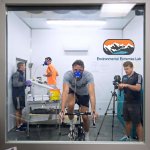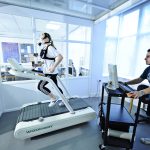Human and Environmental Monitoring
Climatic Stress, Hydration Status, Thermometry, Thermography, Sweat Analysis and Biochemistry
We house a wide range of equipment to support our environmental physiology teaching, research and knowledge exchange activity. We use thermohygrometers to measure indoor and outdoor heat stress, colour charts, osmometers and refractometers to determine hydration status, have multiple methods for examining sweat and a range of data loggers to monitor thermoregulation in the body’s core (via rectal, intestinal or in the aural canal), skin (using wired, semi-wired, wireless or infrared systems) and muscle (via single use or indwelling probes).
Climatic Stress
Hydration Status
Thermometry
Supporting the measurement of muscle temperature is the use of ultrasound to determine the correct depth and angle to insert the needle
Thermography
The FLIR E40bx infrared thermal camera allows imaging of the whole body, or specific sites to be taken to detect radiation. Thermograms which detect this radiation, enable us to observe variations in temperature from different thermal stressors.
Sweat Analyses
Biochemistry
Capillary or venepuncture blood sampling can be carried out to measure a range of metabolites, hormonal and inflammatory markers. ELISA kits are used for some analysis.








































